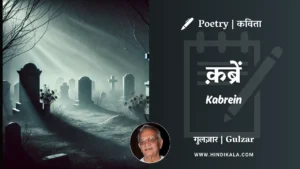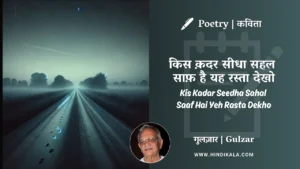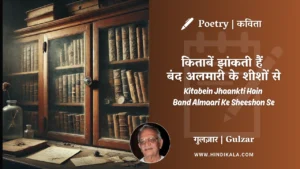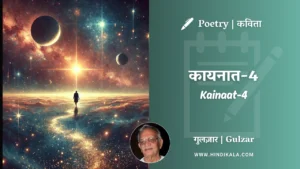Hindi Kala presents Gulzar‘s Poem Aaina – 2 about the Interaction with a Mirror in Hindi & English with the poem’s Meaning (English Translation).

गुलज़ार की आईना-2 अख़बार
मैं जब भी गुजरा हूँ इस आईने से,
इस आईने ने कुतर लिया कोई हिस्सा मेरा।
इस आईने ने कभी मेरा पूरा अक्स वापस
नहीं किया है,
छुपा लिया मेरा कोई पहलू,
दिखा दिया कोई ज़ाविया ऐसा,
जिससे मुझको,मेरा कोई ऐब दिख ना पाए।
मैं खुद को देता रहूँ तसल्ली
कि मुझसा तो दूसरा नहीं है!!
Gulzar’s Poem Aaina-2 in Roman Transcript
Main Jab Bhi Guzra Hoon Is Aaine Se,
Is Aaine Ne Kuttar Liya Koi Hissa Mera.
Is Aaine Ne Kabhi Mera Poora Aks Wapas
Nahi Kiya Hai,
Chhupa Liya Mera Koi Pehlu,
Dikha Diya Koi Zaaviya Aisa,
Jisse Mujhko, Mera Koi Aib Dikh Na Paaye.
Main Khud Ko Deta Rahoon Tasalli
Ki Mujhsa To Doosra Nahi Hai!!
Gulzar’s Poem Aaina-2 Meaning (English Translation)
Every time I’ve passed by this mirror,
This mirror has gnawed away at a part of me.
This mirror has never returned my full reflection,
It has hidden some aspect of me,
Shown me an angle such that,
I couldn’t see any flaw in myself.
I keep assuring myself
That there’s no one else like me!!
Essence of the Poem
This poem explores the psychology of how we see ourselves and the skewed view we frequently have of ourselves.
Key Themes:
Self-deception: Originally intended to reflect reality, the mirror ends up representing self-deception. It distorts our perception of ourselves by concealing our shortcomings and highlighting our strengths.
Fear of imperfection: The speaker’s description of the mirror “gnawing away” at them reveals their anxiety of being seen for their imperfections. The truth about themselves terrifies them.
The search for uniqueness: “I keep assuring myself that there’s no one else like me,” the last statement, shows a deep-seated urge to be distinctive and different.
Interpretation:
The poem makes the argument that people frequently look to outside sources, such as mirrors, for approval and assurance. These reflections, though, can be misleading. They may give us a distorted idea of who we are and keep us from knowing ourselves well. A common human sensation is the speaker’s anxiety of being seen for their imperfections. Our quest for perfection and our fears are reflected in it.
The poem invites the reader to question their own self-perception and to consider the possibility that they may be hiding from their true selves. It encourages us to embrace our imperfections and to seek genuine self-awareness.
You Might Also Like
Tags:








